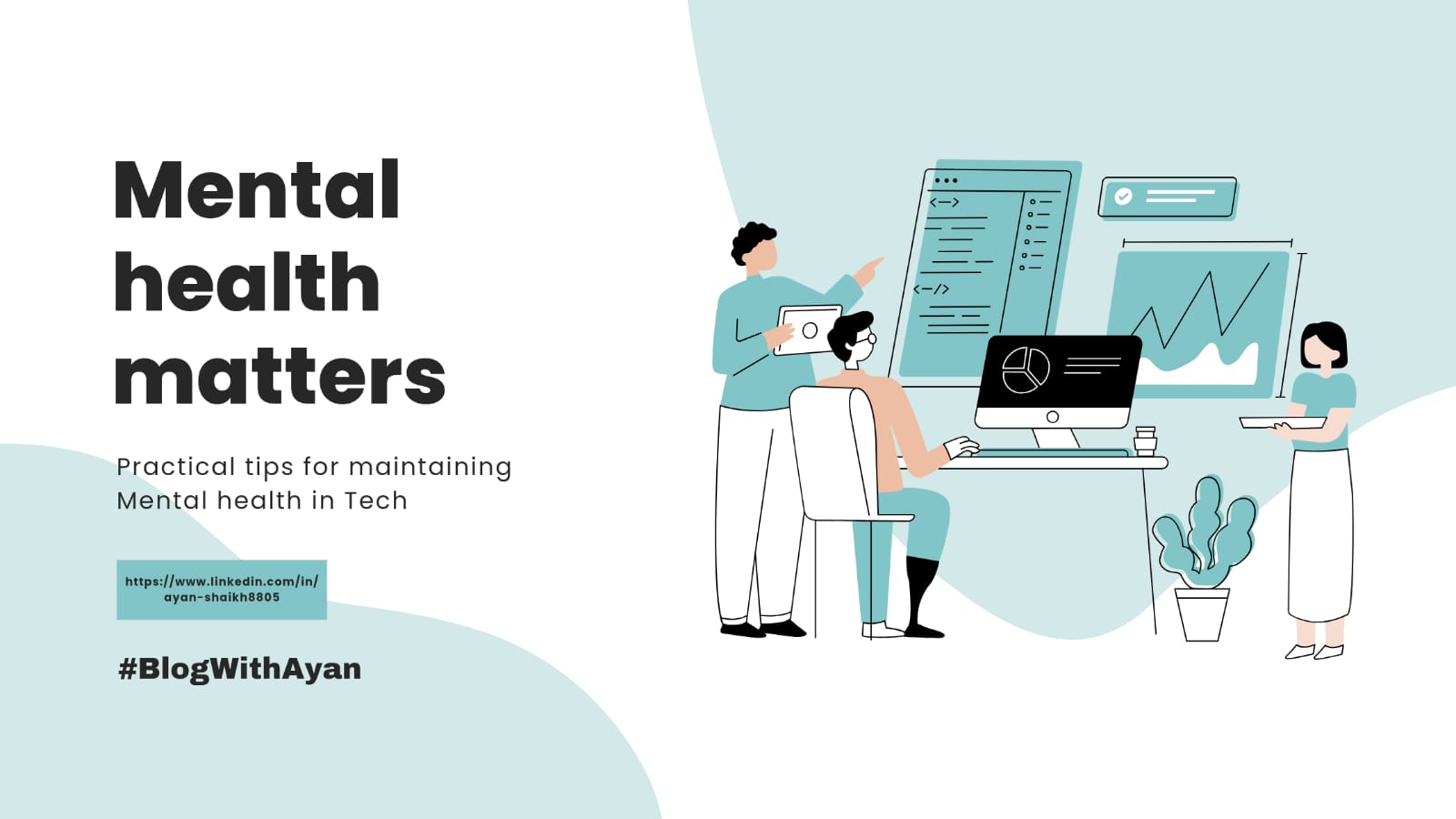"Mind Over Matter: A Tech Student’s Guide to Mental Health and Wellness"
 Ayan
Ayan 
"Understanding the Connection Between Tech and Mental Health: A Personal Journey"
Hello, Hashnode community!
As I am going to begin this exciting journey of blogging here, I want to start by discussing a topic that’s both deeply personal and crucial: mental health. As an engineering student with a passion for technology, I also serve as an empathetic peer counselor and a dedicated mental health advocate. Today, I want to explore how mental health intersects with our tech-driven lives and share insights on how we can all support our mental well-being in this demanding field.
Why Mental Health Matters
In the high-pressure world of technology and engineering, mental health often gets sidelined. The intense workload, tight deadlines, and constant connectivity can lead to burnout, anxiety, and feelings of isolation. Recognizing the importance of mental health, especially in a field as demanding as engineering, is essential for maintaining balance and well-being.
My Journey as an Engineering Student and Peer Counselor
My journey into mental health advocacy and peer counseling began through my personal experiences with stress and overwhelm. As an engineering student, I’ve encountered the pressures and challenges that come with the territory. To better manage these challenges, I was fortunate to receive training and guidance from a professional counseling psychologist at my institute. This training provided me with invaluable skills to handle mental stress and overcome it effectively.
Through this professional guidance, I developed a more optimistic approach to managing stress and supporting others. My role as a peer counselor has allowed me to use these skills to offer support and resources to my peers while continuing to pursue my studies and career in technology.
Practical Tips for Maintaining Mental Health in Tech
Here are some practical tips that have been helpful for me and might benefit you as well:
Set Boundaries: Establish clear work and study hours to prevent them from encroaching on your personal time. Maintaining these boundaries is crucial for a healthy work-life balance.
Take Regular Breaks: Incorporate breaks into your routine to reduce stress and maintain productivity. Techniques like the Pomodoro Technique can help manage your time effectively.
Seek Professional Support: Don’t hesitate to reach out for help when needed. Whether it’s through professional counseling, talking to a trusted friend, or connecting with a peer counselor, support is key.
Practice Mindfulness: Engage in mindfulness practices such as meditation or deep-breathing exercises. These techniques can help manage stress and improve overall mental clarity.
Stay Active: Regular physical activity can significantly reduce stress and boost your mood. Even brief periods of exercise can make a difference.
Connect with Others: Build and maintain relationships with your peers and colleagues. A supportive network can help alleviate feelings of isolation and provide emotional support.
Celebrate Your Achievements: Acknowledge and celebrate your accomplishments, no matter how small. This practice can help build a positive mindset and motivate you to continue striving forward.
Creating a Supportive Tech Community
As members of the tech community, we have the power to create a more supportive environment for mental health. Here’s how we can contribute:
Encourage Open Dialogue: Foster conversations about mental health within your teams and academic settings. Normalizing these discussions helps reduce stigma and promotes a supportive atmosphere.
Advocate for Resources: Support the availability of mental health resources and training programs. Providing access to these tools can significantly benefit everyone involved.
Show Empathy and Support: Extend understanding and support to those who may be struggling. Small acts of kindness and empathy can have a profound impact.
In Conclusion
Mental health is a vital aspect of our overall well-being and deserves the same attention as our physical health. As an engineering student, an empathetic peer counselor, and a mental health advocate, I am committed to raising awareness and supporting those facing mental health challenges. I hope this post encourages a broader conversation about mental health in the tech field and inspires a supportive community for all.
Thank you for joining me on this journey. I look forward to engaging with you and exploring more topics at the intersection of technology and mental health.
Feel free to join the conversation! If you have any thoughts or experiences related to mental health and technology, I’d love to hear from you.
Stay well and take care,
Ayan Shaikh.
#MentalHealth #EngineeringStudent #TechWellness #PeerCounseling #TechCommunity #MentalHealthAwareness #StudentLife #WorkLifeBalance #TechIndustry #SelfCare
Subscribe to my newsletter
Read articles from Ayan directly inside your inbox. Subscribe to the newsletter, and don't miss out.
Written by

Ayan
Ayan
Hello! I'm Ayan Shaikh a passionate technologist with a diverse skill set in web applications, data science, machine learning, and cloud computing. I specialize in data science and Cloud computing. I also enjoy sharing my knowledge through technical writing, code reviews, and mentorship, helping developers improve their skills and practices. As an active member of Toastmasters International, I hone my public speaking skills and participate in tech conferences and webinars. Beyond tech, I'm a mental health advocate and peer counselor, supporting individuals with empathy and understanding. In my free time, I explore advancements in data science, machine learning, and cloud computing. Feel free to connect if you'd like to collaborate or chat about tech, mental health, or anything in between!